
views
Building a Platform and Team

Identify things you can improve. People are looking to vote for a leader who will improve their lives in some way or manage things effectively. Identify problems in people's lives and think of ways to solve them. This will give voters a reason to vote for you, especially if you have a plan that resonates with them. For instance, if you’re trying to be student body president, you can think of ways to improve the cafeteria food and provide free supplies and materials for students. If you’re running for city council, potential problems could involve things like trash collection or graffiti in the park.
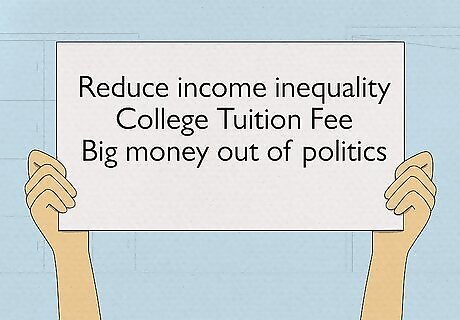
Build a campaign message that provides solutions. Identify two or three big issues that you'd like to change and flesh out a plan on how to accomplish your goals. Choose issues that are important to your voters. A clear campaign message will help people understand what you're all about. Concentrate on talking about your message when speaking to potential voters or making speeches. A campaign message shouldn't be overly long, complex, or confusing. It can be a couple of sentences that hit on the core ideas of your campaign. For instance, if you were running for chair-person of the health department, your campaign message could include lowering the costs of healthcare, improving patient satisfaction, and providing free ongoing education for doctors. For instance, for the 2016 presidential primaries, Bernie Sanders ran on a platform to reduce income inequality, making college tuition free, and getting big money out of politics.

Build a diverse and talented team. The more diversity on your team, the more opinions and views you can get from people who are similar to your voters. Make sure that each team member is up for the task and that they understand their role in the campaign. Encourage input and try to get as many perspectives as you can. Roles could include campaign manager, treasurer, fundraiser, and communications director. If you're trying to get elected to a smaller role, you could assign roles to create posters or talk to people about your platform.

Identify your base of voters. If you consider your ideas progressive, target voters who think progressively. If you have a more conservative or moderate viewpoint, target moderates and conservatives. Concentrating on getting your message out to people who already agree with your platform will get you more votes. If you are running a professional political campaign, you can canvass or survey potential voters in the area to get a list of people who share your concerns or support your platform. If you're running for something in school, you should target students who are active in school activities, as they will be the ones that are most affected by student government.
Communicating with Voters
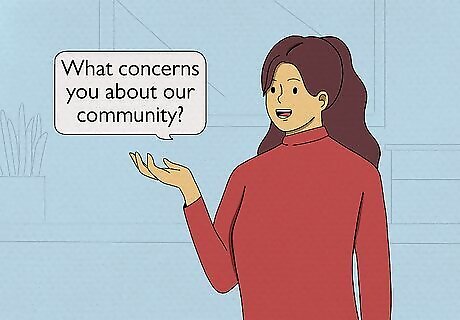
Network with voters. Talk to as many people as you can from all different walks of life. Let them know that you’re running for the position. The more people that you connect with on a personal level, the more votes you’ll get. Some voters may even tell family and friends about your campaign. Never act snobby and always be willing to speak to an eligible voter about their opinions or the problems that they are having. You can say things like, "So, why did you come out today?" or "What concerns you about our community?" You can go to events, festivals, parks, and other areas where people meet up socially. If you are running for student government position, you can attend sports events, art shows, concerts, and talk to people during lunch and recess.
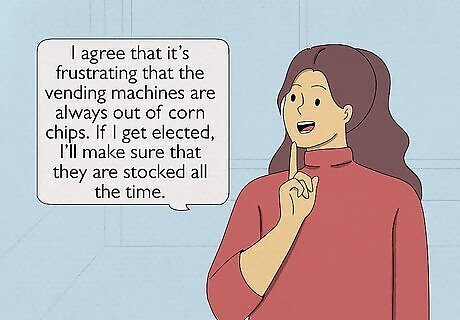
Talk with influential people who can promote you. Identify people who others look up to for advice or guidance and convince them of the benefits of voting for you. Be polite and positive and relate to them on a personal level. If you can convince them that you’re smart, capable, and have good ideas, they will be more likely to encourage others to vote for you. When speaking with an influential person you can say something like, “I agree that it’s frustrating that the vending machines are always out of corn chips. If I get elected, I’ll make sure that they are stocked all the time.” If you are running for a political office, you should speak to business owners and community leaders.

Send your team out to promote you. Leading up to the election day, have your team go out and talk to the voters on your behalf. Make sure that they understand your message and can answer questions that voters might have. You could even consider creating a script that they can memorize so that they can stay on message. For instance, you could tell your team to say something like, "Vote for Garrett for student body president! He's going to try to get the school to renovate the gym and start a poetry club!" If you're running for political office you could say something like, "Vote for Joe Smoe--a progressive family man who plans to close the income gap and raise the minimum wage!"

Take opportunities to speak publicly. The more visible and recognizable your name is, the more likely people will be to vote for you. Contact event coordinators and see if you can speak before an event. If you're running for student government, talk to school administrators to see if you can make a speech in front of the school. If people have to choose between someone they know and an unknown candidate, they will usually vote for the person that they know.
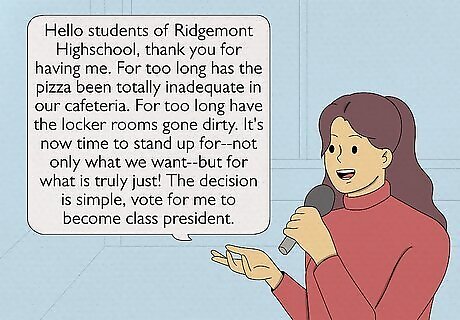
Write powerful campaign speeches. Talk about your passion for the voters and issues and explain how your election can improve people’s lives. Always start the speech by thanking the audience for being there. Rehearse the speech in front of a mirror and make it as moving as you can. Practice the speech in front of your team, friends, or family and ask them how it sounds. Take advice from other people and refine your campaign speeches until they are perfect. Your speech could start like, "Hello students of Ridgemont Highschool, thank you for having me. For too long has the pizza been totally inadequate in our cafeteria. For too long have the locker rooms gone dirty. It's now time to stand up for--not only what we want--but for what is truly just! The decision is simple, vote for me to become class president." When President Barack Obama's announced that he planned on running for president he said, "We all made this journey for a reason. It's humbling, but in my heart I know you didn't come here just for me, you came here because you believe in what this country can be. In the face of war, you believe there can be peace. In the face of despair, you believe there can be hope. In the face of a politics that's shut you out, that's told you to settle, that's divided us for too long, you believe we can be one people, reaching for what's possible, building that more perfect union."
Being an Attractive Candidate

Be authentic. While you want to appeal to voters, you don’t want to go overboard and come off as fake or contrived. Make sure to always be yourself and don’t campaign for things that you oppose. Be as honest and understanding as you can.

Look clean and organized. If you look disheveled or unorganized, it will make people less confident in your leadership abilities. Shower regularly and wear clean and pressed clothes. Always try to look your best, especially when you’re in front of potential voters. Voters must believe that you’re able to manage your own life in order for you to be a good leader.
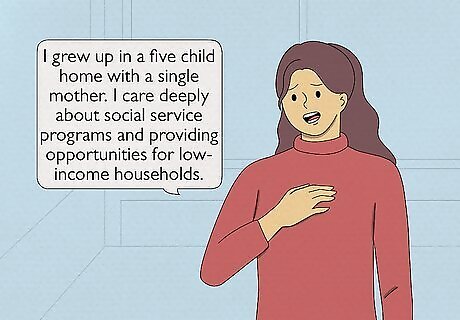
Show your passion for the issues. Voters want a candidate that cares about them and what they are going through. If you don’t have a passion for the issues you’re talking about, it will seem like you don’t care about the voters. Talk about personal triumphs or experiences that help shape your point of view. Show voters that you’re serious about making improvements and implementing your ideas. You can say something like, "I grew up in a five child home with a single mother. I care deeply about social service programs and providing opportunities for low-income households."

Be confident about your ideas. If you are going for a leadership position, people want to know that you’re confident enough to lead. However, you don’t want to go overboard and come off as arrogant or pompous. When you speak about issues or ideas, be yourself. Have confidence that your stance is the best stance and that it will help the people who need it.

Be enthusiastic when solving problems. If you’re always low energy, you can come off as boring or apathetic. Try to approach problems and situations with a high energy level but don’t overdo it. If you act overly enthusiastic or energetic it could come off as immature, overly-ambitious, or contrived. Instead, always stay realistic but show that you have the energy to solve problems. You can say something like, "This problem is a huge obstacle, but it's one that we can overcome. This student body has so much energy and intelligence that once we put our mind to something, we are unstoppable."
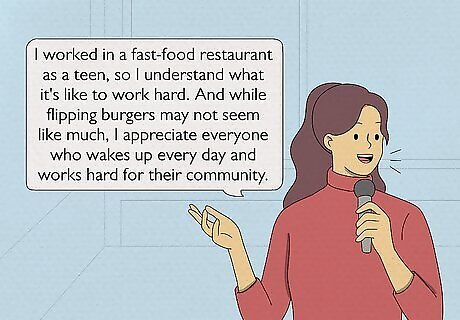
Be charismatic and personable. You should try to be generally liked among your voters. You can do this by smiling and making the occasional tasteful joke. Rather than concentrating on being perfect, try to be relatable. You can say something like, "I worked in a fast-food restaurant as a teen, so I understand what it's like to work hard. And while flipping burgers may not seem like much, I appreciate everyone who wakes up every day and works hard for their community."



















Comments
0 comment